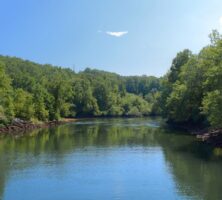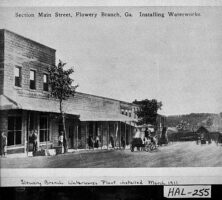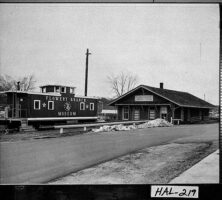Flowery Branch is located in Hall County on the shores of Lake Lanier in northeast Georgia.
The town, incorporated in 1903, is forty-five miles from Atlanta and twelve miles from Gainesville, the seat of Hall County. According to the 2020 U.S. census, the population of Flowery Branch was 9,391 an increase from the 2010 population of 5,679.

Once the site of an early Indian trading post, Flowery Branch was originally called Anaguluskee, a Cherokee word that translates as “flowers on the branch [stream].” A few white settlers lived in the area before 1874, the year the town was officially founded as a railroad stop on the newly completed Atlanta to Charlotte, North Carolina, section of the Atlanta and Richmond Air Line (later Norfolk Southern). The town became the center of the northeast Georgia cotton market, and as it grew, it attracted new businesses, including the furniture and leather industries. By the turn of the twentieth century, the town’s most prosperous years, thousands of bales of cotton and crates full of locally manufactured furniture were shipped annually from the Flowery Branch Depot. The decline of the cotton market in the 1920s signaled the end of the town’s importance in the region, and Flowery Branch went into a period of decline. The town’s fortunes began shifting around the turn of the millennium, as the residents of Flowery Branch developed events and facilities meant to encourage tourism.
In 1985 Flowery Branch’s Main Street was listed on the national and state registers for historic places, due to its many nineteenth-century and early twentieth-century buildings, including the historic train depot. The depot was rehabilitated through federal and city funding and is now used as a community center, welcome center, and museum.

In the 1970s Wrigley, the chewing-gum manufacturer, located a plant in Flowery Branch and is still a major provider of jobs in the region. In 2004 the Atlanta Falcons football team announced that it would move its training facility to Flowery Branch, where the team is headquartered. A $20 million training campus was completed in time for the 2005 training season.
Notable residents have included the National Baseball Hall of Fame pitcher Phil Niekro and the self-taught artist Carlton Garrett, whose work is displayed in the High Museum of Art.









